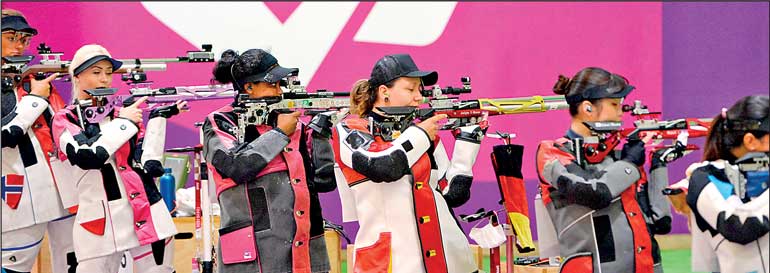Wednesday Feb 25, 2026
Wednesday Feb 25, 2026
Monday, 2 August 2021 00:00 - - {{hitsCtrl.values.hits}}

Following its representation at the ongoing Tokyo Olympics, the National Shooting Sport Federation of Sri Lanka (NSSF) is on the verge of grooming its community of shooting athletes to become internationally potential competitors. The NSSF’s objective is precise in targeting the next Olympic Games to be held in Paris, France in 2024, but with straight qualification.
Tehani Egodawela represented Sri Lanka in the women’s 10m air rifle event, but her entry to the Tokyo Games was made possible through a Tripartite Invitation Quota, which was made available to the world by the International Shooting Sport Federation (ISSF) to only six athletes with credentials.
Egodawela’s name was picked by the ISSF for the specified event, the women’s 10m air rifle, in which she was placed 49th among 50 participants. But this was an Olympic that most international shooters would like to forget, given the overall outcome of the event, in particular Egodawela’s.
“The final results show where we really stand in the world, as well as other international shooters. It was an event that most elaborate and reputed shooters failed, and some unexpected talents outshone. Overall, what depicted was the lack of proper international meets during the period of closer to two years, due to the pandemic,” said NSSF President Shirantha Peries.
The event Egodawela competed in had many favourites, including the world India’s Apurvi Chandela, who holds the world record of 252.9 points in a women’s 10m air rifle final; but Chandela, too, was placed 36th in the qualifiers and India, being a stronghold in shooting sports from the South Asian region, had many of its athletes competing but failed to qualify for the top eight, besides one in the men’s 10m air rifle event.
“This is a sport where concentration and focus are paramount. One slight mishap can be costly, and this was highly evident among many shooters. But countries that adapted well to the new conditions truly overcame the situation. There are lessons to learn, truly valuable ones,” Peries added, giving an indication of a futuristic plan to make shooting sport a globally appeasing.
With what NSSF had to undergo and experience throughout the recent months and years, Peries and his team are attempting in creating a healthier environment for shooters in Sri Lanka, where future outcomes would benefit the country. His vision, upon being re-elected as the president for another tenure of four years, is for the NSSF to have steady growth but with cemented plans to make shooting sports more engaged and popular.
Among the plans are to create a national shooting range with the highest involvement of the Ministry of Sports and other higher authorities, and more focus on junior athletes, who would become the flag-bearers of the sport, which needs greater commitment and concentration.
“It’s all about taking the sport to the highest level possible, with the involvement of all stakeholders. If I could lead that exercise with perfection, I’m sure it will be a matter of taking the baton and moving forward to the future. We have a greater responsibility as administrators to make sure things are in place while we are in charge, and make the future of shooting sport bright and promising than it is today,” Peries vowed with confidence.